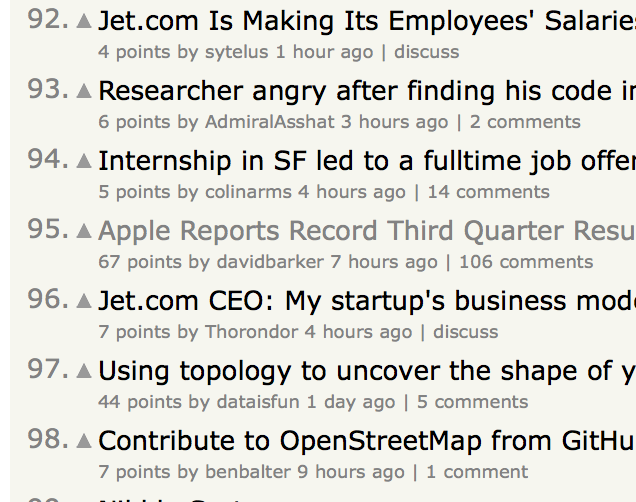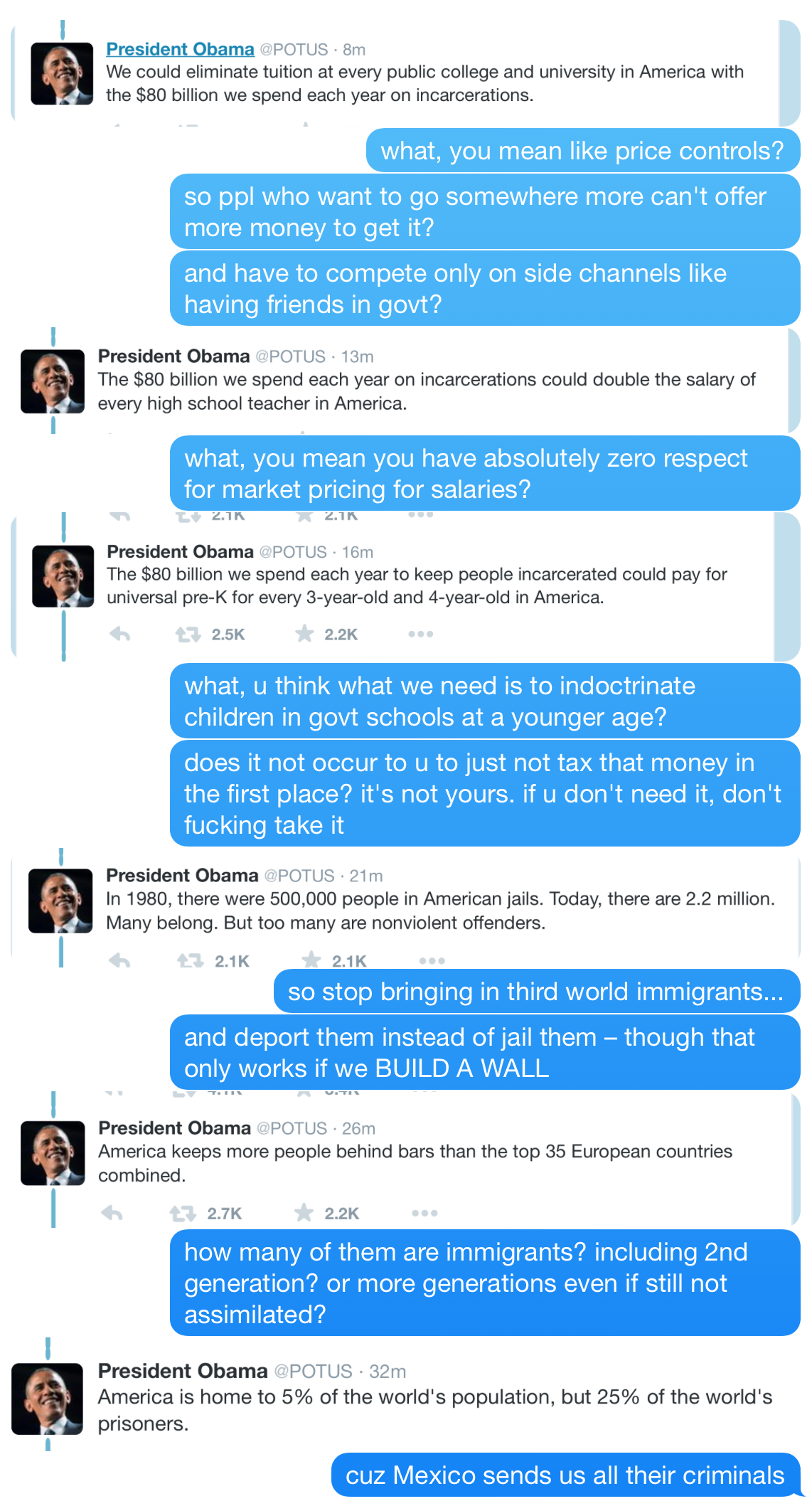TIME TO CALL OBAMA AND KERRY WHAT THEY ARE: TRAITORS Once in the Senate, Kerry flew to support the Sandinista Marxist killers in Nicaragua. Just as Iran’s leader calling for “Death to America” didn’t slow down Kerry, neither did the Sandinista cries of “Here or There, Yankees Will Die Everywhere.”
it really is this clear. Iran's president literally was at a "Death to America" (and "Death to Israel") rally a few days ago.
Obama isn’t Chamberlain. He doesn’t mean well. Kerry isn’t making honest mistakes. They negotiated ineptly with Iran because they are throwing the game. They meant for America to lose all along.
this is really hard for people to stomach, but that doesn't prevent it from being true.
Iran is also pursuing ICBMs that can strike at Europe and America. Obama’s decision to phase out the ballistic missile sanctions on Iran will make it easier for Iran to build weapons that can destroy major American cities.
the high degree of evil here – which some may find shocking and hard to conceive of – does not prevent this from being the plain truth.
Obama and Kerry have not made this deal as representatives of the United States, but as representatives of a toxic ideology that views America as the cause of all that is wrong in the world. This is not an agreement that strengthens us and keeps us safe, but an agreement that weakens us and endangers us negotiated by men who believe that a strong Iran is better than a strong America.
Their ideology is that of the screaming anti-war protester denouncing American forces and foreign policy anywhere and everywhere, whose worldview has changed little since crying, “Ho! Ho! Ho Chi Minh. NLF is going to win” in the streets. The only difference is that he now wears an expensive suit.
Their ideology is not America. It is not American. It is the same poisonous left-wing hatred which led Kerry to the Viet Cong, to the Sandinistas and to Assad. It is the same resentment of America that Obama carried to Cairo, Havana and Tehran. We have met the enemy and he is in the White House.
how did we come to this? poor critical thinking skills by most people is a big part of the underlying issue. people need better philosophy.
OBAMA'S IRAN NUKE DEAL LIES
negotiations on the bad Iran deal may be finished. but every time inspectors want to visit a nuclear site, that's requires another negotiation with Iran. the article provides this quote showing how the agreement is nothing like the "anytime, anywhere" inspections that were the absolutely lowest bar the US should have considered agreeing to:
If the absence of undeclared nuclear materials and activities or activities inconsistent with the JCPOA cannot be verified after the implementation of the alternative arrangements agreed by Iran and the IAEA, or if the two sides are unable to reach satisfactory arrangements to verify the absence of undeclared nuclear materials and activities or activities inconsistent with the JCPOA at the specified locations within 14 days of the IAEA’s original request for access, Iran, in consultation with the members of the Joint Commission, would resolve the IAEA’s concerns through necessary means agreed between Iran and the IAEA. In the absence of an agreement, the members of the Joint Commission, by consensus or by a vote of 5 or more of its 8 members, would advise on the necessary means to resolve the IAEA's concerns. The process of consultation with, and any action by, the members of the Joint Commission would not exceed 7 days, and Iran would implement the necessary means within 3 additional days.
what a mess. and Iran itself has one of the votes...
OBAMA SIGNS IRAN DEAL AS ROUHANI ATTENDS A 'DEATH TO AMERICA' EVENT While most normal countries maintain national holidays that celebrate freedom, independence and sacrifice, the mullahs [of Iran] invented a holiday that revels in an orgy of death, violence and depravity.
sacrifice, huh? sure not an Objectivist writer! :(
this article is otherwise good. it contains important details about Iran deal that I hadn't read before. the bullet point summary of Obama's Iran deal is terrible. the fine details are even worse.
CONGRESS MUST ACT ON THE CATASTROPHIC NUCLEAR DEAL
how was the Iran deal reached so suddenly? how were the disagreements resolved? the best available theory is that Obama ordered the US negotiators to cave on everything. that's why the deal is so bad for us on every issue. and it explains the removal of the regular arms embargo on Iran:
Seeing the desperation of President Obama, the shrewd Iranian leaders even brought the issue of the UN arms embargo against Iran to the negotiating table in the eleventh hour. Russia and China support the Islamic Republic because they are the major actors selling arms and sophisticated weapons to the Islamic Republic.
The UN arms embargo on the Islamic Republic did not have anything to do with the nuclear talks. It was imposed on Iran by the United Nations Security Council members due to Tehran’s terrorist activities and due to the concerns brought up by many other countries with regard to Iran’s regional aggression and military activities, as well as the nation's regional hegemonic ambitions. The embargo was due to Iran’s support for militias and proxies causing instability in the region as well.
But, the ruling clerics (with the Russians and Chinese on their side) thought that they could get any concessions from the US, particularly from the weak US president. Iranian, Russian and Chinese leaders know that President Obama will do anything to avoid the collapse of the talks even if his objective and goal might lead to one of the greatest threats and mistakes in international diplomacy and deals.
DISARMING AMERICA
obama and the left have been destroying the US military. massive damage already done, more scheduled soon. seriously. read this one and see the specifics for yourself. how the US military can no longer handle two wars at once like it's supposed to be able to. due to budget cuts, the army doesn't have enough men, the Navy doesn't have enough ships, and a lot of outdated equipment is still in use. and the budget cuts are a continuing process. some important areas now have zero aircraft carrier presence part of the time.
THE IRAN FAILURE HAS MANY FATHERS We must remember that Obama pointedly ran on the promise to “reinvigorate” American diplomacy. This trope was in fact a way to run against George Bush, whom the Dems and the media had caricatured as a “cowboy” with an itchy trigger finger, a gunslinger scornful of diplomacy and multilateralism. That charge was a lie––Bush wasted several months on diplomacy in an unsuccessful attempt to get the U.N.’s sanction for the war, even though the U.S. Congress had approved it, Hussein was in gross violation of the first Gulf War cease-fire agreement, and the U.N. already has passed 17 Security Council resolutions, all of which Hussein had violated.
Yeah! People really try to twist history around. I also remember that the Dems were in favor of the Iraq war until months after it started.
But as much as Obama is personally to blame for what will turn out to be a disastrous foreign policy mistake, the larger problem is the very notion that rational discussion, negotiation, and dickering with our enemies and rivals can replace force, rather than being an adjunct to a credible threat of force. It is based on the arrogant assumption that the enemy is a “rational actor,” as Obama’s flacks have been asserting about the mullahs, and respects life, coexistence, and peace as much as we. That this administration can believe this delusion––when the Iranians regularly chant “Death to America” and have practiced what they preach by killing Americans for 36 years––is as mystifyingly blind as the British were to Hitler’s threatening rants at the Nuremburg Party Rally a few weeks before the Munich conference, when the Fuhrer called Czechoslovakia an “irreconcilable” enemy.
When they repeatedly say they want to kill you, it's a pretty big hint they don't respect life the same way civilized Americans do. But many Americans won't listen to them or acknowledge their cultural differences.
Plato, of course, expressed the truth of interstate relations 24 centuries earlier, when he said, “In reality, every state is in a natural state of war with every other,” and “peace is only a name.”
I don't agree at all. Peace is possible. There are multiple civilized countries which now have some pretty good records of peace between themselves. Who actually thinks that USA and Australia should naturally be at war, and their peaceful relations are just a name?
Thorton then quotes Charles de Gaulle saying that "passion and self-interest" are the "root cause of armed conflict in men and nations". This is extremely anti-Objectivist and anti-(classical)-liberal.
Rational men don't have to have conflicts of interest. If they understand the right ways to interact – trade, tolerance for different ideas, voluntary non-violent interaction requiring mutual consent – then they can mutually benefit from interactions and otherwise leave each other alone.
Today, many of civilization's defenders don't understand the philosophical ideas and values that got us here. No, it wasn't Plato's idea mutual antagonism and war that created our peaceful, prosperous Western world.


